Lumiere in Durham, UK: Social Media Strategy for Durham Marriott
VerifiedAdded on 2020/05/28
|31
|6627
|37
Report
AI Summary
This report provides a comprehensive analysis of the social media strategy employed by the Durham Marriott Hotel Royal County in the UK, focusing on its promotion of the Lumiere light festival. The report begins with a literature review exploring the use of social media in the international tourism and hospitality industries, including segmentation, targeting, and positioning (STP) strategies. It then delves into a case study of the Durham Marriott Hotel, examining its social media presence and promotional activities related to the Lumiere festival. The analysis incorporates a PESTLE analysis to assess the political, economic, social, technological, legal, and environmental factors influencing the hotel's marketing efforts. The report concludes with findings regarding the hotel's STP strategy, macroeconomic factors, and integrated promotion on social media, offering recommendations for enhancing its social media promotion strategy, including more aggressive use of platforms like Facebook and Instagram. The paper is divided into three broad sections, namely, the literature review section, the case study and the concluding section.
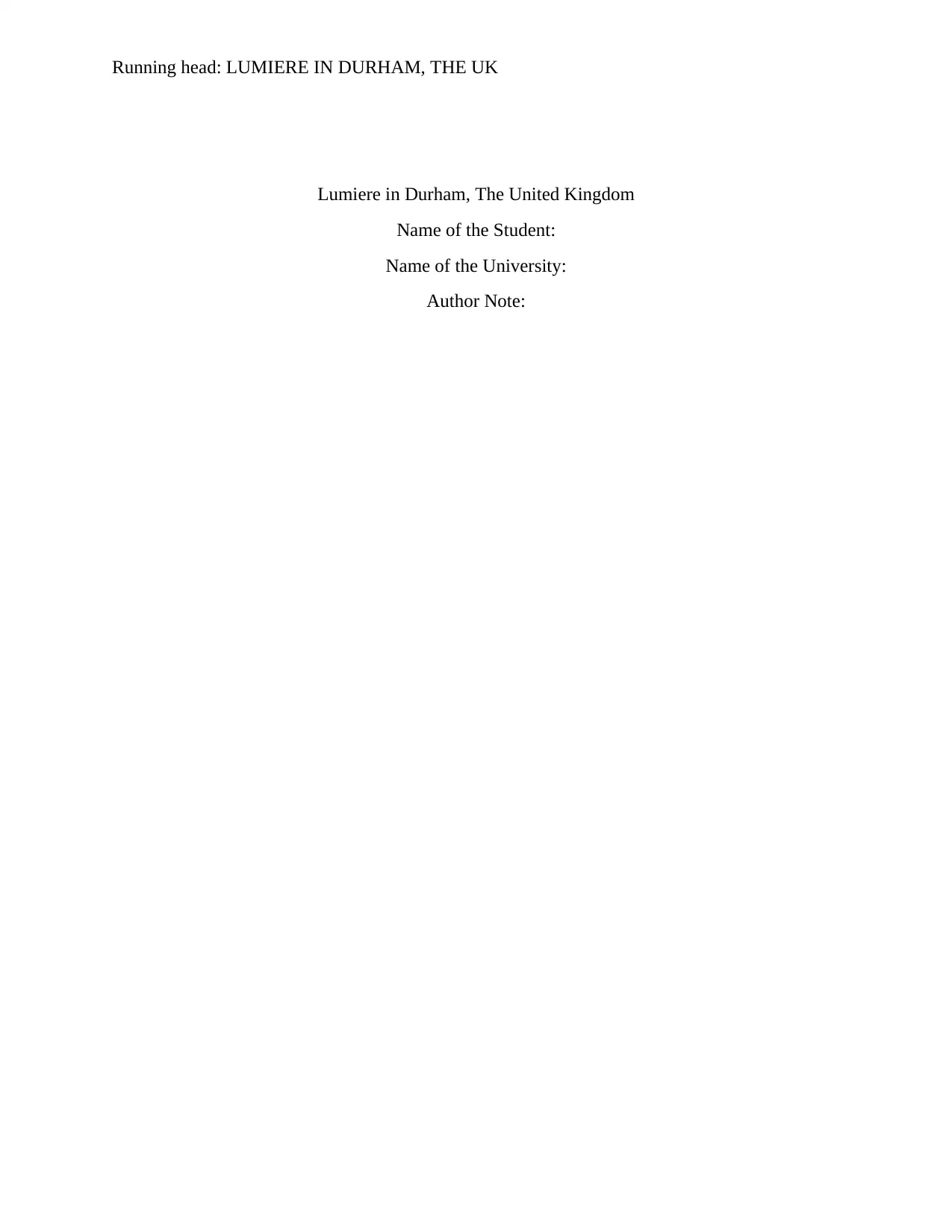
Running head: LUMIERE IN DURHAM, THE UK
Lumiere in Durham, The United Kingdom
Name of the Student:
Name of the University:
Author Note:
Lumiere in Durham, The United Kingdom
Name of the Student:
Name of the University:
Author Note:
Paraphrase This Document
Need a fresh take? Get an instant paraphrase of this document with our AI Paraphraser
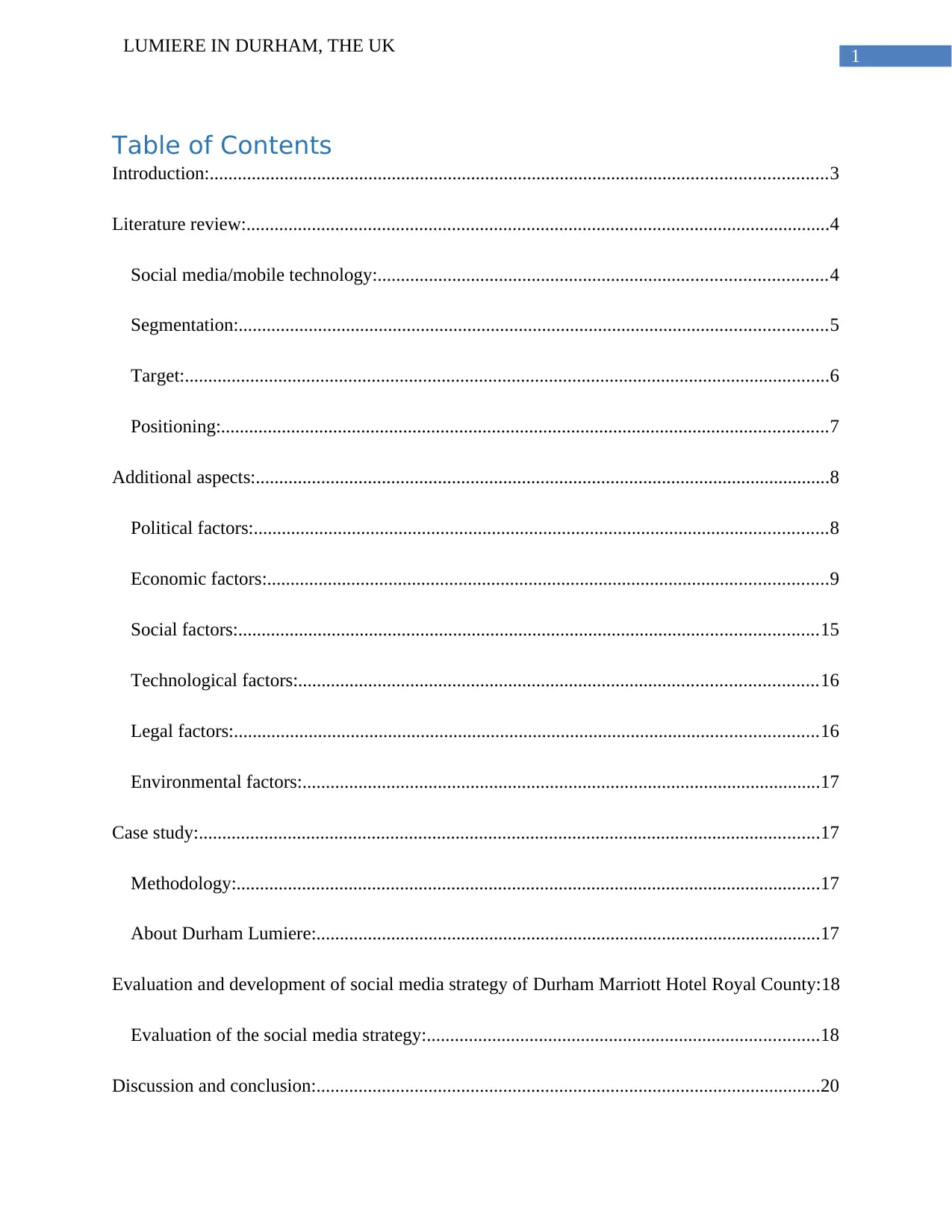
1
LUMIERE IN DURHAM, THE UK
Table of Contents
Introduction:....................................................................................................................................3
Literature review:.............................................................................................................................4
Social media/mobile technology:................................................................................................4
Segmentation:..............................................................................................................................5
Target:..........................................................................................................................................6
Positioning:..................................................................................................................................7
Additional aspects:...........................................................................................................................8
Political factors:...........................................................................................................................8
Economic factors:........................................................................................................................9
Social factors:............................................................................................................................15
Technological factors:...............................................................................................................16
Legal factors:.............................................................................................................................16
Environmental factors:...............................................................................................................17
Case study:.....................................................................................................................................17
Methodology:.............................................................................................................................17
About Durham Lumiere:............................................................................................................17
Evaluation and development of social media strategy of Durham Marriott Hotel Royal County:18
Evaluation of the social media strategy:....................................................................................18
Discussion and conclusion:............................................................................................................20
LUMIERE IN DURHAM, THE UK
Table of Contents
Introduction:....................................................................................................................................3
Literature review:.............................................................................................................................4
Social media/mobile technology:................................................................................................4
Segmentation:..............................................................................................................................5
Target:..........................................................................................................................................6
Positioning:..................................................................................................................................7
Additional aspects:...........................................................................................................................8
Political factors:...........................................................................................................................8
Economic factors:........................................................................................................................9
Social factors:............................................................................................................................15
Technological factors:...............................................................................................................16
Legal factors:.............................................................................................................................16
Environmental factors:...............................................................................................................17
Case study:.....................................................................................................................................17
Methodology:.............................................................................................................................17
About Durham Lumiere:............................................................................................................17
Evaluation and development of social media strategy of Durham Marriott Hotel Royal County:18
Evaluation of the social media strategy:....................................................................................18
Discussion and conclusion:............................................................................................................20
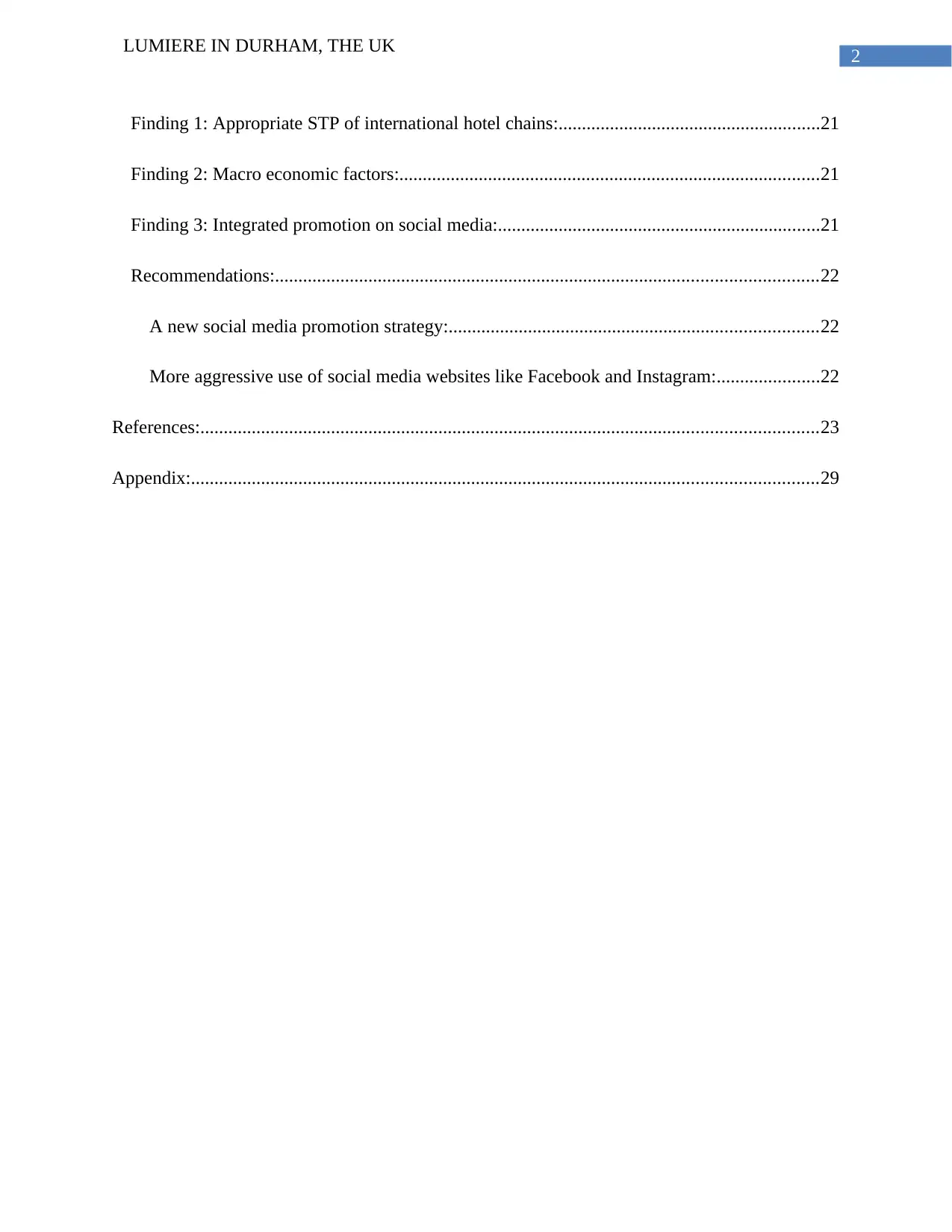
2
LUMIERE IN DURHAM, THE UK
Finding 1: Appropriate STP of international hotel chains:........................................................21
Finding 2: Macro economic factors:..........................................................................................21
Finding 3: Integrated promotion on social media:.....................................................................21
Recommendations:....................................................................................................................22
A new social media promotion strategy:...............................................................................22
More aggressive use of social media websites like Facebook and Instagram:......................22
References:....................................................................................................................................23
Appendix:......................................................................................................................................29
LUMIERE IN DURHAM, THE UK
Finding 1: Appropriate STP of international hotel chains:........................................................21
Finding 2: Macro economic factors:..........................................................................................21
Finding 3: Integrated promotion on social media:.....................................................................21
Recommendations:....................................................................................................................22
A new social media promotion strategy:...............................................................................22
More aggressive use of social media websites like Facebook and Instagram:......................22
References:....................................................................................................................................23
Appendix:......................................................................................................................................29
⊘ This is a preview!⊘
Do you want full access?
Subscribe today to unlock all pages.

Trusted by 1+ million students worldwide
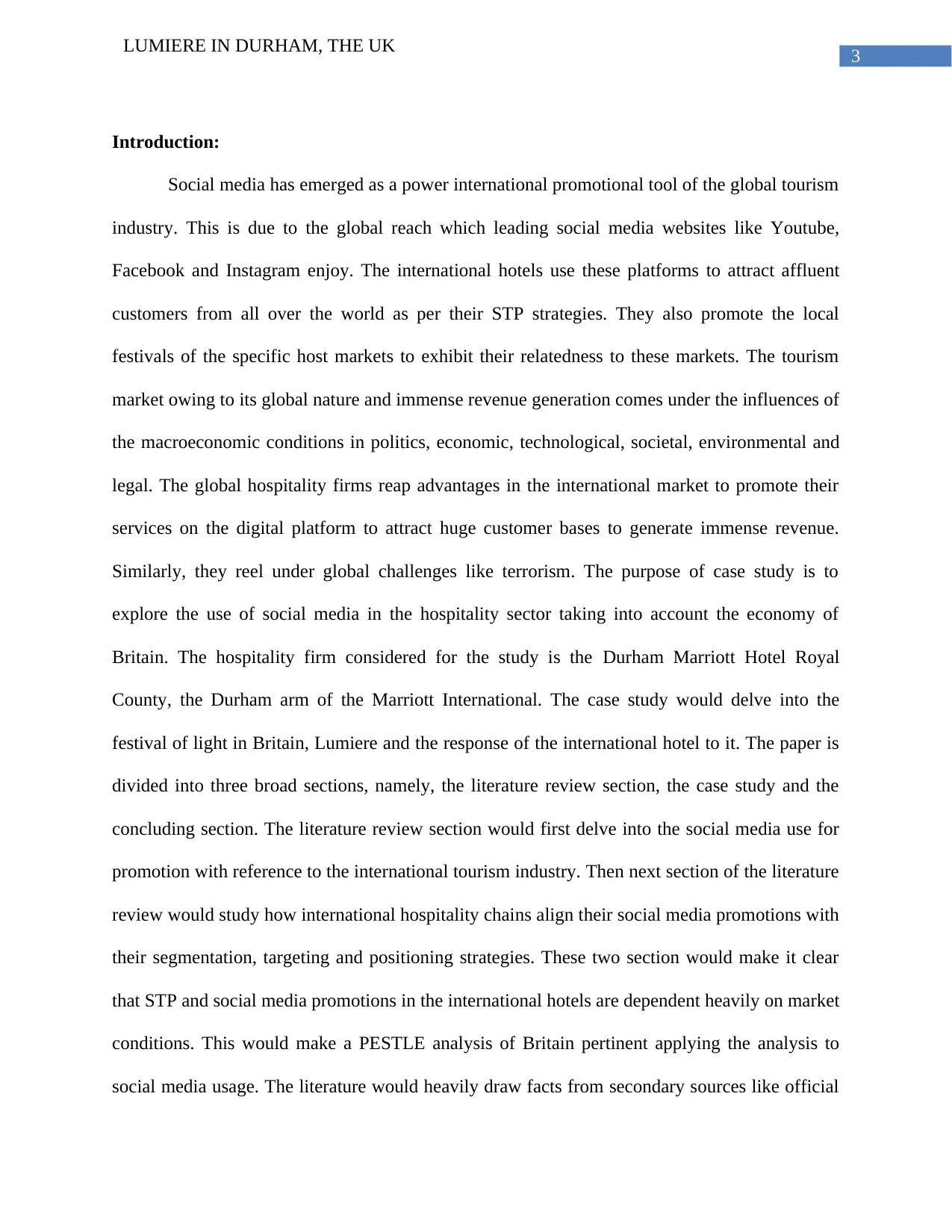
3
LUMIERE IN DURHAM, THE UK
Introduction:
Social media has emerged as a power international promotional tool of the global tourism
industry. This is due to the global reach which leading social media websites like Youtube,
Facebook and Instagram enjoy. The international hotels use these platforms to attract affluent
customers from all over the world as per their STP strategies. They also promote the local
festivals of the specific host markets to exhibit their relatedness to these markets. The tourism
market owing to its global nature and immense revenue generation comes under the influences of
the macroeconomic conditions in politics, economic, technological, societal, environmental and
legal. The global hospitality firms reap advantages in the international market to promote their
services on the digital platform to attract huge customer bases to generate immense revenue.
Similarly, they reel under global challenges like terrorism. The purpose of case study is to
explore the use of social media in the hospitality sector taking into account the economy of
Britain. The hospitality firm considered for the study is the Durham Marriott Hotel Royal
County, the Durham arm of the Marriott International. The case study would delve into the
festival of light in Britain, Lumiere and the response of the international hotel to it. The paper is
divided into three broad sections, namely, the literature review section, the case study and the
concluding section. The literature review section would first delve into the social media use for
promotion with reference to the international tourism industry. Then next section of the literature
review would study how international hospitality chains align their social media promotions with
their segmentation, targeting and positioning strategies. These two section would make it clear
that STP and social media promotions in the international hotels are dependent heavily on market
conditions. This would make a PESTLE analysis of Britain pertinent applying the analysis to
social media usage. The literature would heavily draw facts from secondary sources like official
LUMIERE IN DURHAM, THE UK
Introduction:
Social media has emerged as a power international promotional tool of the global tourism
industry. This is due to the global reach which leading social media websites like Youtube,
Facebook and Instagram enjoy. The international hotels use these platforms to attract affluent
customers from all over the world as per their STP strategies. They also promote the local
festivals of the specific host markets to exhibit their relatedness to these markets. The tourism
market owing to its global nature and immense revenue generation comes under the influences of
the macroeconomic conditions in politics, economic, technological, societal, environmental and
legal. The global hospitality firms reap advantages in the international market to promote their
services on the digital platform to attract huge customer bases to generate immense revenue.
Similarly, they reel under global challenges like terrorism. The purpose of case study is to
explore the use of social media in the hospitality sector taking into account the economy of
Britain. The hospitality firm considered for the study is the Durham Marriott Hotel Royal
County, the Durham arm of the Marriott International. The case study would delve into the
festival of light in Britain, Lumiere and the response of the international hotel to it. The paper is
divided into three broad sections, namely, the literature review section, the case study and the
concluding section. The literature review section would first delve into the social media use for
promotion with reference to the international tourism industry. Then next section of the literature
review would study how international hospitality chains align their social media promotions with
their segmentation, targeting and positioning strategies. These two section would make it clear
that STP and social media promotions in the international hotels are dependent heavily on market
conditions. This would make a PESTLE analysis of Britain pertinent applying the analysis to
social media usage. The literature would heavily draw facts from secondary sources like official
Paraphrase This Document
Need a fresh take? Get an instant paraphrase of this document with our AI Paraphraser
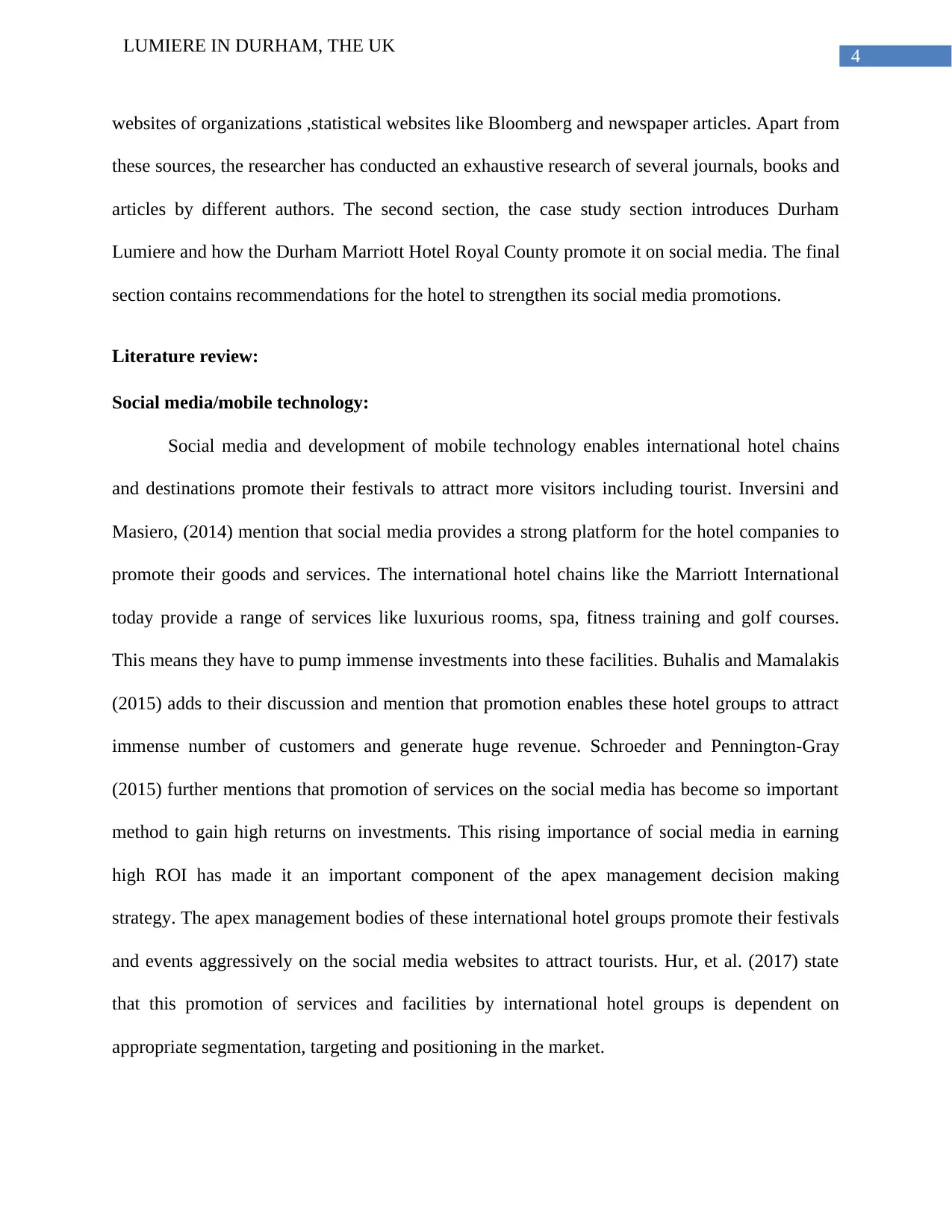
4
LUMIERE IN DURHAM, THE UK
websites of organizations ,statistical websites like Bloomberg and newspaper articles. Apart from
these sources, the researcher has conducted an exhaustive research of several journals, books and
articles by different authors. The second section, the case study section introduces Durham
Lumiere and how the Durham Marriott Hotel Royal County promote it on social media. The final
section contains recommendations for the hotel to strengthen its social media promotions.
Literature review:
Social media/mobile technology:
Social media and development of mobile technology enables international hotel chains
and destinations promote their festivals to attract more visitors including tourist. Inversini and
Masiero, (2014) mention that social media provides a strong platform for the hotel companies to
promote their goods and services. The international hotel chains like the Marriott International
today provide a range of services like luxurious rooms, spa, fitness training and golf courses.
This means they have to pump immense investments into these facilities. Buhalis and Mamalakis
(2015) adds to their discussion and mention that promotion enables these hotel groups to attract
immense number of customers and generate huge revenue. Schroeder and Pennington-Gray
(2015) further mentions that promotion of services on the social media has become so important
method to gain high returns on investments. This rising importance of social media in earning
high ROI has made it an important component of the apex management decision making
strategy. The apex management bodies of these international hotel groups promote their festivals
and events aggressively on the social media websites to attract tourists. Hur, et al. (2017) state
that this promotion of services and facilities by international hotel groups is dependent on
appropriate segmentation, targeting and positioning in the market.
LUMIERE IN DURHAM, THE UK
websites of organizations ,statistical websites like Bloomberg and newspaper articles. Apart from
these sources, the researcher has conducted an exhaustive research of several journals, books and
articles by different authors. The second section, the case study section introduces Durham
Lumiere and how the Durham Marriott Hotel Royal County promote it on social media. The final
section contains recommendations for the hotel to strengthen its social media promotions.
Literature review:
Social media/mobile technology:
Social media and development of mobile technology enables international hotel chains
and destinations promote their festivals to attract more visitors including tourist. Inversini and
Masiero, (2014) mention that social media provides a strong platform for the hotel companies to
promote their goods and services. The international hotel chains like the Marriott International
today provide a range of services like luxurious rooms, spa, fitness training and golf courses.
This means they have to pump immense investments into these facilities. Buhalis and Mamalakis
(2015) adds to their discussion and mention that promotion enables these hotel groups to attract
immense number of customers and generate huge revenue. Schroeder and Pennington-Gray
(2015) further mentions that promotion of services on the social media has become so important
method to gain high returns on investments. This rising importance of social media in earning
high ROI has made it an important component of the apex management decision making
strategy. The apex management bodies of these international hotel groups promote their festivals
and events aggressively on the social media websites to attract tourists. Hur, et al. (2017) state
that this promotion of services and facilities by international hotel groups is dependent on
appropriate segmentation, targeting and positioning in the market.

5
LUMIERE IN DURHAM, THE UK
Segmentation:
Dolnicar et al.(2014) mentions that hotel groups segment their market on several grounds
like geography, social status and life style. The international groups of hotels target the middle
and the upper class customers who have sufficient disposable income to afford premium
accommodation and fooding services. The latest trend in the tourism industry is that hotel groups
today is to expose the customers to the authentic cuisine and artefacts of the place. The Durham
Marriott Hotel Royal County services authentic English cuisine to enhance the experience of the
international tourists (marriott.com 2018). International hotels today host conventions, corporate
events and cultural events for these rich segments of customers which enable them to earn huge
revenue. The international hotels also provide facilities for conventions and conferences to the
multinational companies and wedding and other family function facilities to the upper class
domestic customers. Social media allows them to get access to these appropriate customer
segments which they serve to generate revenue.
LUMIERE IN DURHAM, THE UK
Segmentation:
Dolnicar et al.(2014) mentions that hotel groups segment their market on several grounds
like geography, social status and life style. The international groups of hotels target the middle
and the upper class customers who have sufficient disposable income to afford premium
accommodation and fooding services. The latest trend in the tourism industry is that hotel groups
today is to expose the customers to the authentic cuisine and artefacts of the place. The Durham
Marriott Hotel Royal County services authentic English cuisine to enhance the experience of the
international tourists (marriott.com 2018). International hotels today host conventions, corporate
events and cultural events for these rich segments of customers which enable them to earn huge
revenue. The international hotels also provide facilities for conventions and conferences to the
multinational companies and wedding and other family function facilities to the upper class
domestic customers. Social media allows them to get access to these appropriate customer
segments which they serve to generate revenue.
⊘ This is a preview!⊘
Do you want full access?
Subscribe today to unlock all pages.

Trusted by 1+ million students worldwide
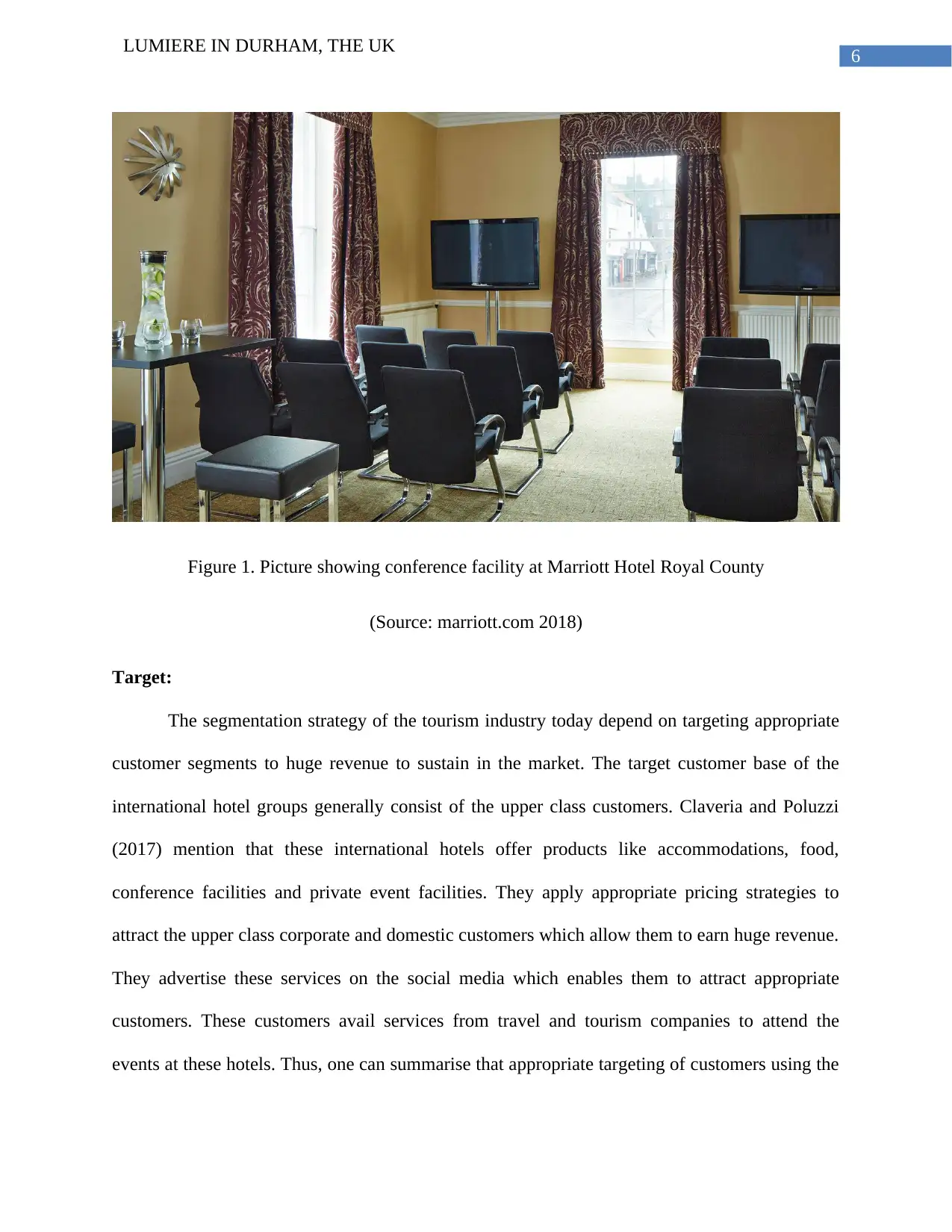
6
LUMIERE IN DURHAM, THE UK
Figure 1. Picture showing conference facility at Marriott Hotel Royal County
(Source: marriott.com 2018)
Target:
The segmentation strategy of the tourism industry today depend on targeting appropriate
customer segments to huge revenue to sustain in the market. The target customer base of the
international hotel groups generally consist of the upper class customers. Claveria and Poluzzi
(2017) mention that these international hotels offer products like accommodations, food,
conference facilities and private event facilities. They apply appropriate pricing strategies to
attract the upper class corporate and domestic customers which allow them to earn huge revenue.
They advertise these services on the social media which enables them to attract appropriate
customers. These customers avail services from travel and tourism companies to attend the
events at these hotels. Thus, one can summarise that appropriate targeting of customers using the
LUMIERE IN DURHAM, THE UK
Figure 1. Picture showing conference facility at Marriott Hotel Royal County
(Source: marriott.com 2018)
Target:
The segmentation strategy of the tourism industry today depend on targeting appropriate
customer segments to huge revenue to sustain in the market. The target customer base of the
international hotel groups generally consist of the upper class customers. Claveria and Poluzzi
(2017) mention that these international hotels offer products like accommodations, food,
conference facilities and private event facilities. They apply appropriate pricing strategies to
attract the upper class corporate and domestic customers which allow them to earn huge revenue.
They advertise these services on the social media which enables them to attract appropriate
customers. These customers avail services from travel and tourism companies to attend the
events at these hotels. Thus, one can summarise that appropriate targeting of customers using the
Paraphrase This Document
Need a fresh take? Get an instant paraphrase of this document with our AI Paraphraser
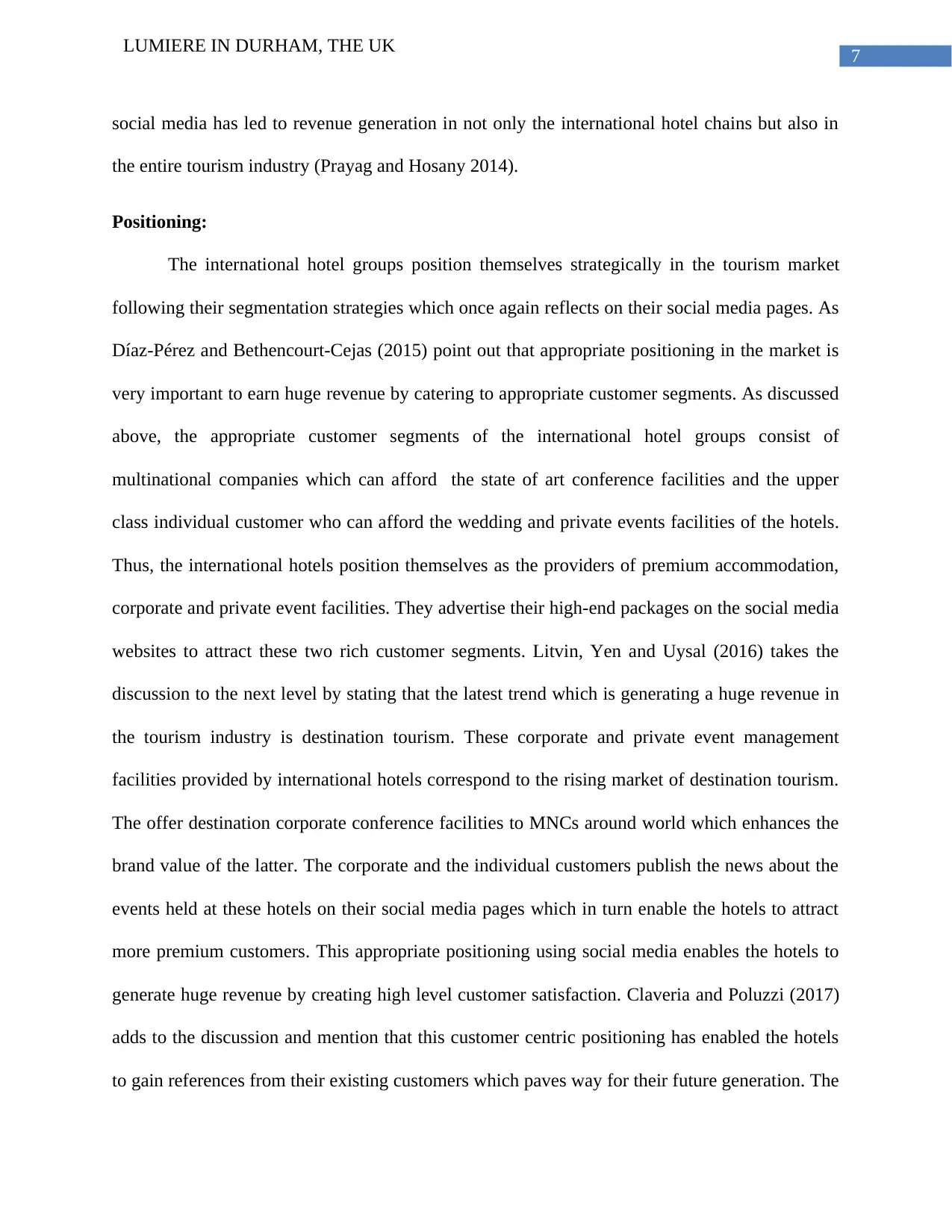
7
LUMIERE IN DURHAM, THE UK
social media has led to revenue generation in not only the international hotel chains but also in
the entire tourism industry (Prayag and Hosany 2014).
Positioning:
The international hotel groups position themselves strategically in the tourism market
following their segmentation strategies which once again reflects on their social media pages. As
Díaz-Pérez and Bethencourt-Cejas (2015) point out that appropriate positioning in the market is
very important to earn huge revenue by catering to appropriate customer segments. As discussed
above, the appropriate customer segments of the international hotel groups consist of
multinational companies which can afford the state of art conference facilities and the upper
class individual customer who can afford the wedding and private events facilities of the hotels.
Thus, the international hotels position themselves as the providers of premium accommodation,
corporate and private event facilities. They advertise their high-end packages on the social media
websites to attract these two rich customer segments. Litvin, Yen and Uysal (2016) takes the
discussion to the next level by stating that the latest trend which is generating a huge revenue in
the tourism industry is destination tourism. These corporate and private event management
facilities provided by international hotels correspond to the rising market of destination tourism.
The offer destination corporate conference facilities to MNCs around world which enhances the
brand value of the latter. The corporate and the individual customers publish the news about the
events held at these hotels on their social media pages which in turn enable the hotels to attract
more premium customers. This appropriate positioning using social media enables the hotels to
generate huge revenue by creating high level customer satisfaction. Claveria and Poluzzi (2017)
adds to the discussion and mention that this customer centric positioning has enabled the hotels
to gain references from their existing customers which paves way for their future generation. The
LUMIERE IN DURHAM, THE UK
social media has led to revenue generation in not only the international hotel chains but also in
the entire tourism industry (Prayag and Hosany 2014).
Positioning:
The international hotel groups position themselves strategically in the tourism market
following their segmentation strategies which once again reflects on their social media pages. As
Díaz-Pérez and Bethencourt-Cejas (2015) point out that appropriate positioning in the market is
very important to earn huge revenue by catering to appropriate customer segments. As discussed
above, the appropriate customer segments of the international hotel groups consist of
multinational companies which can afford the state of art conference facilities and the upper
class individual customer who can afford the wedding and private events facilities of the hotels.
Thus, the international hotels position themselves as the providers of premium accommodation,
corporate and private event facilities. They advertise their high-end packages on the social media
websites to attract these two rich customer segments. Litvin, Yen and Uysal (2016) takes the
discussion to the next level by stating that the latest trend which is generating a huge revenue in
the tourism industry is destination tourism. These corporate and private event management
facilities provided by international hotels correspond to the rising market of destination tourism.
The offer destination corporate conference facilities to MNCs around world which enhances the
brand value of the latter. The corporate and the individual customers publish the news about the
events held at these hotels on their social media pages which in turn enable the hotels to attract
more premium customers. This appropriate positioning using social media enables the hotels to
generate huge revenue by creating high level customer satisfaction. Claveria and Poluzzi (2017)
adds to the discussion and mention that this customer centric positioning has enabled the hotels
to gain references from their existing customers which paves way for their future generation. The
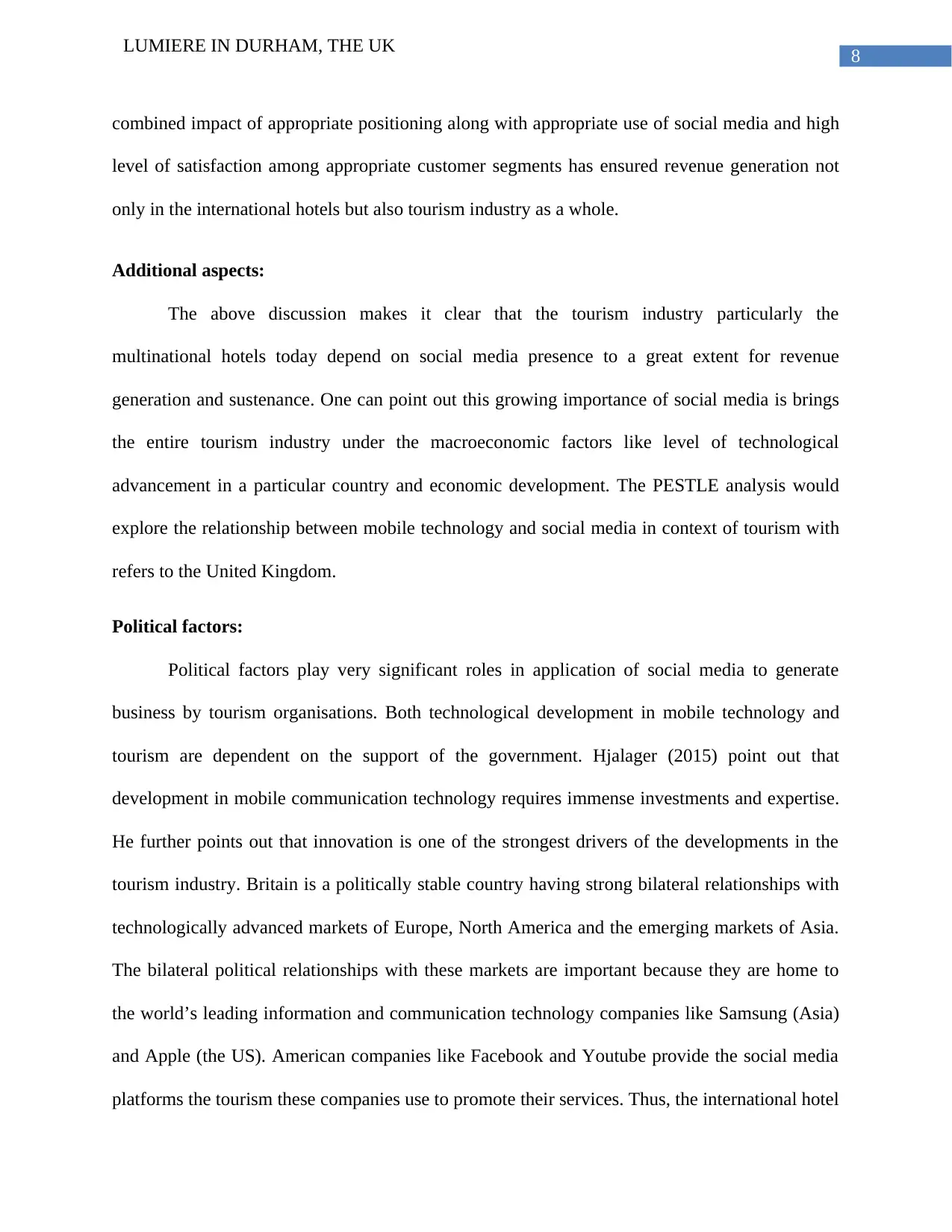
8
LUMIERE IN DURHAM, THE UK
combined impact of appropriate positioning along with appropriate use of social media and high
level of satisfaction among appropriate customer segments has ensured revenue generation not
only in the international hotels but also tourism industry as a whole.
Additional aspects:
The above discussion makes it clear that the tourism industry particularly the
multinational hotels today depend on social media presence to a great extent for revenue
generation and sustenance. One can point out this growing importance of social media is brings
the entire tourism industry under the macroeconomic factors like level of technological
advancement in a particular country and economic development. The PESTLE analysis would
explore the relationship between mobile technology and social media in context of tourism with
refers to the United Kingdom.
Political factors:
Political factors play very significant roles in application of social media to generate
business by tourism organisations. Both technological development in mobile technology and
tourism are dependent on the support of the government. Hjalager (2015) point out that
development in mobile communication technology requires immense investments and expertise.
He further points out that innovation is one of the strongest drivers of the developments in the
tourism industry. Britain is a politically stable country having strong bilateral relationships with
technologically advanced markets of Europe, North America and the emerging markets of Asia.
The bilateral political relationships with these markets are important because they are home to
the world’s leading information and communication technology companies like Samsung (Asia)
and Apple (the US). American companies like Facebook and Youtube provide the social media
platforms the tourism these companies use to promote their services. Thus, the international hotel
LUMIERE IN DURHAM, THE UK
combined impact of appropriate positioning along with appropriate use of social media and high
level of satisfaction among appropriate customer segments has ensured revenue generation not
only in the international hotels but also tourism industry as a whole.
Additional aspects:
The above discussion makes it clear that the tourism industry particularly the
multinational hotels today depend on social media presence to a great extent for revenue
generation and sustenance. One can point out this growing importance of social media is brings
the entire tourism industry under the macroeconomic factors like level of technological
advancement in a particular country and economic development. The PESTLE analysis would
explore the relationship between mobile technology and social media in context of tourism with
refers to the United Kingdom.
Political factors:
Political factors play very significant roles in application of social media to generate
business by tourism organisations. Both technological development in mobile technology and
tourism are dependent on the support of the government. Hjalager (2015) point out that
development in mobile communication technology requires immense investments and expertise.
He further points out that innovation is one of the strongest drivers of the developments in the
tourism industry. Britain is a politically stable country having strong bilateral relationships with
technologically advanced markets of Europe, North America and the emerging markets of Asia.
The bilateral political relationships with these markets are important because they are home to
the world’s leading information and communication technology companies like Samsung (Asia)
and Apple (the US). American companies like Facebook and Youtube provide the social media
platforms the tourism these companies use to promote their services. Thus, the international hotel
⊘ This is a preview!⊘
Do you want full access?
Subscribe today to unlock all pages.

Trusted by 1+ million students worldwide
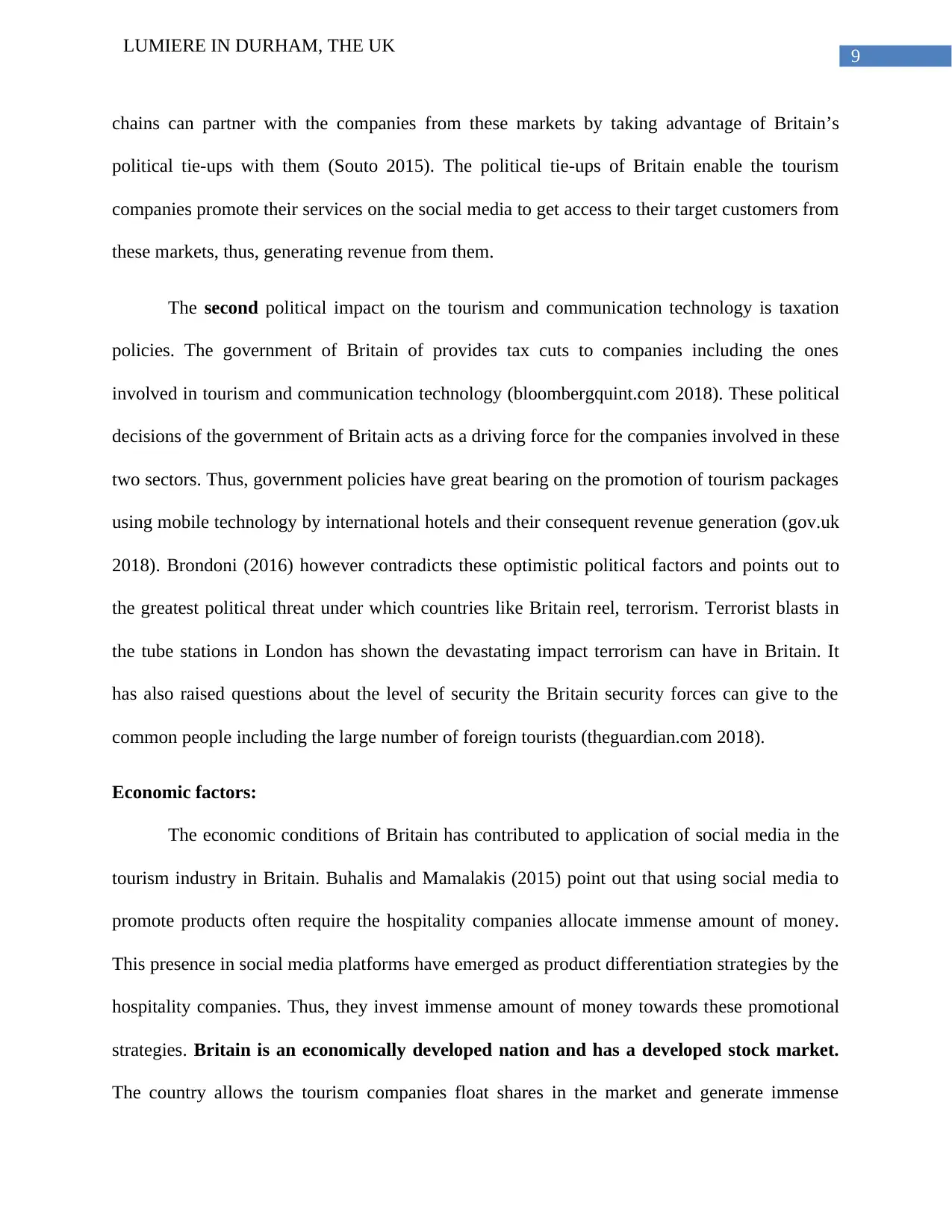
9
LUMIERE IN DURHAM, THE UK
chains can partner with the companies from these markets by taking advantage of Britain’s
political tie-ups with them (Souto 2015). The political tie-ups of Britain enable the tourism
companies promote their services on the social media to get access to their target customers from
these markets, thus, generating revenue from them.
The second political impact on the tourism and communication technology is taxation
policies. The government of Britain of provides tax cuts to companies including the ones
involved in tourism and communication technology (bloombergquint.com 2018). These political
decisions of the government of Britain acts as a driving force for the companies involved in these
two sectors. Thus, government policies have great bearing on the promotion of tourism packages
using mobile technology by international hotels and their consequent revenue generation (gov.uk
2018). Brondoni (2016) however contradicts these optimistic political factors and points out to
the greatest political threat under which countries like Britain reel, terrorism. Terrorist blasts in
the tube stations in London has shown the devastating impact terrorism can have in Britain. It
has also raised questions about the level of security the Britain security forces can give to the
common people including the large number of foreign tourists (theguardian.com 2018).
Economic factors:
The economic conditions of Britain has contributed to application of social media in the
tourism industry in Britain. Buhalis and Mamalakis (2015) point out that using social media to
promote products often require the hospitality companies allocate immense amount of money.
This presence in social media platforms have emerged as product differentiation strategies by the
hospitality companies. Thus, they invest immense amount of money towards these promotional
strategies. Britain is an economically developed nation and has a developed stock market.
The country allows the tourism companies float shares in the market and generate immense
LUMIERE IN DURHAM, THE UK
chains can partner with the companies from these markets by taking advantage of Britain’s
political tie-ups with them (Souto 2015). The political tie-ups of Britain enable the tourism
companies promote their services on the social media to get access to their target customers from
these markets, thus, generating revenue from them.
The second political impact on the tourism and communication technology is taxation
policies. The government of Britain of provides tax cuts to companies including the ones
involved in tourism and communication technology (bloombergquint.com 2018). These political
decisions of the government of Britain acts as a driving force for the companies involved in these
two sectors. Thus, government policies have great bearing on the promotion of tourism packages
using mobile technology by international hotels and their consequent revenue generation (gov.uk
2018). Brondoni (2016) however contradicts these optimistic political factors and points out to
the greatest political threat under which countries like Britain reel, terrorism. Terrorist blasts in
the tube stations in London has shown the devastating impact terrorism can have in Britain. It
has also raised questions about the level of security the Britain security forces can give to the
common people including the large number of foreign tourists (theguardian.com 2018).
Economic factors:
The economic conditions of Britain has contributed to application of social media in the
tourism industry in Britain. Buhalis and Mamalakis (2015) point out that using social media to
promote products often require the hospitality companies allocate immense amount of money.
This presence in social media platforms have emerged as product differentiation strategies by the
hospitality companies. Thus, they invest immense amount of money towards these promotional
strategies. Britain is an economically developed nation and has a developed stock market.
The country allows the tourism companies float shares in the market and generate immense
Paraphrase This Document
Need a fresh take? Get an instant paraphrase of this document with our AI Paraphraser
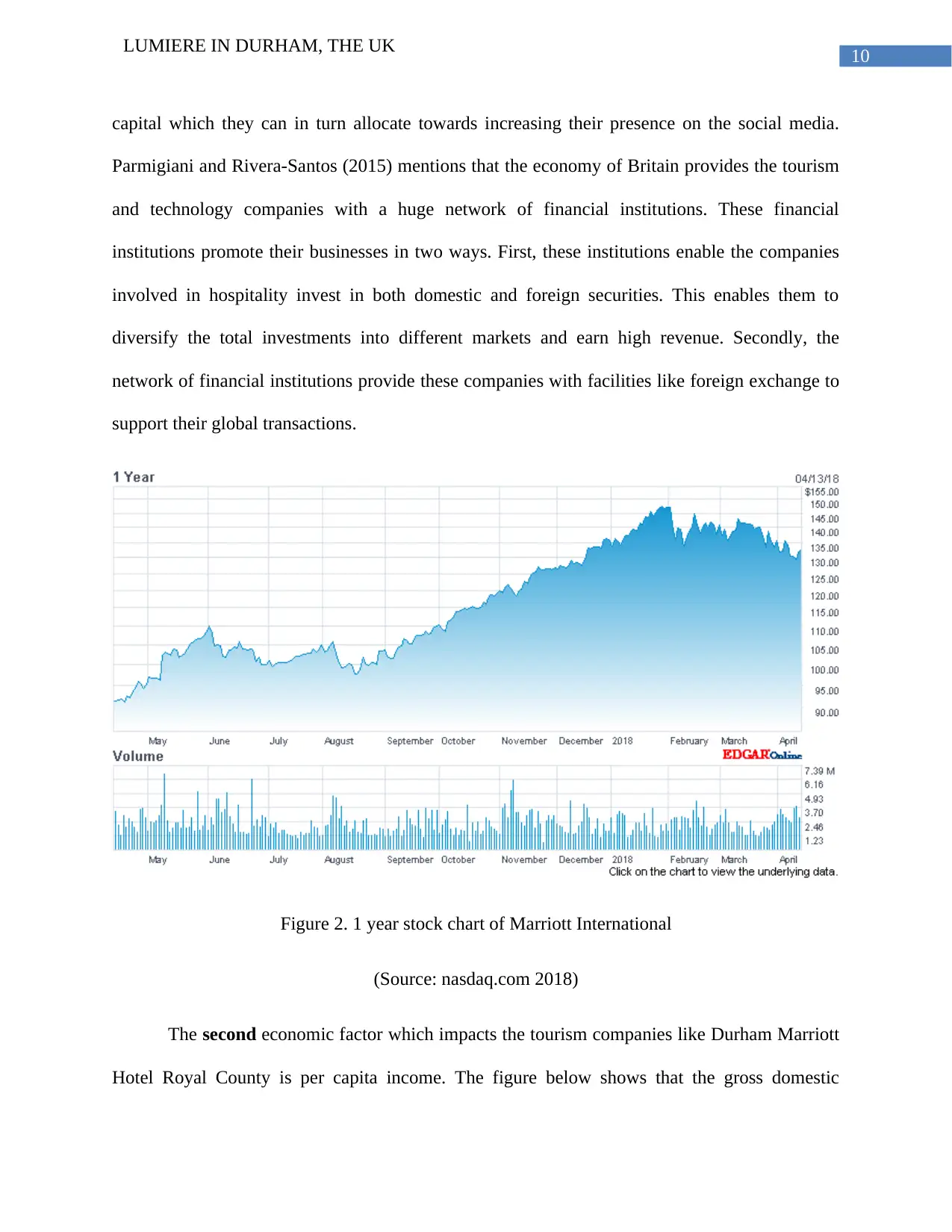
10
LUMIERE IN DURHAM, THE UK
capital which they can in turn allocate towards increasing their presence on the social media.
Parmigiani and Rivera-Santos (2015) mentions that the economy of Britain provides the tourism
and technology companies with a huge network of financial institutions. These financial
institutions promote their businesses in two ways. First, these institutions enable the companies
involved in hospitality invest in both domestic and foreign securities. This enables them to
diversify the total investments into different markets and earn high revenue. Secondly, the
network of financial institutions provide these companies with facilities like foreign exchange to
support their global transactions.
Figure 2. 1 year stock chart of Marriott International
(Source: nasdaq.com 2018)
The second economic factor which impacts the tourism companies like Durham Marriott
Hotel Royal County is per capita income. The figure below shows that the gross domestic
LUMIERE IN DURHAM, THE UK
capital which they can in turn allocate towards increasing their presence on the social media.
Parmigiani and Rivera-Santos (2015) mentions that the economy of Britain provides the tourism
and technology companies with a huge network of financial institutions. These financial
institutions promote their businesses in two ways. First, these institutions enable the companies
involved in hospitality invest in both domestic and foreign securities. This enables them to
diversify the total investments into different markets and earn high revenue. Secondly, the
network of financial institutions provide these companies with facilities like foreign exchange to
support their global transactions.
Figure 2. 1 year stock chart of Marriott International
(Source: nasdaq.com 2018)
The second economic factor which impacts the tourism companies like Durham Marriott
Hotel Royal County is per capita income. The figure below shows that the gross domestic
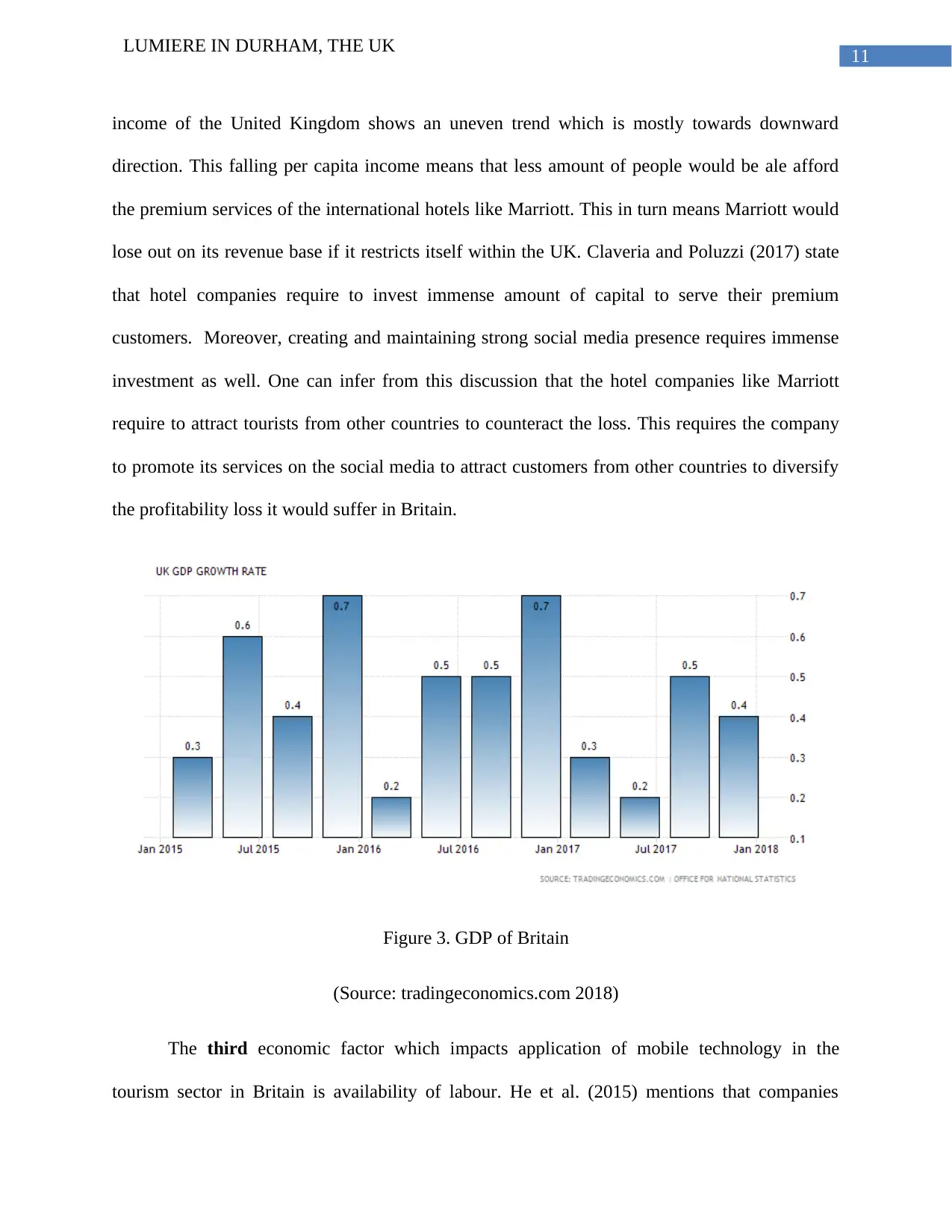
11
LUMIERE IN DURHAM, THE UK
income of the United Kingdom shows an uneven trend which is mostly towards downward
direction. This falling per capita income means that less amount of people would be ale afford
the premium services of the international hotels like Marriott. This in turn means Marriott would
lose out on its revenue base if it restricts itself within the UK. Claveria and Poluzzi (2017) state
that hotel companies require to invest immense amount of capital to serve their premium
customers. Moreover, creating and maintaining strong social media presence requires immense
investment as well. One can infer from this discussion that the hotel companies like Marriott
require to attract tourists from other countries to counteract the loss. This requires the company
to promote its services on the social media to attract customers from other countries to diversify
the profitability loss it would suffer in Britain.
Figure 3. GDP of Britain
(Source: tradingeconomics.com 2018)
The third economic factor which impacts application of mobile technology in the
tourism sector in Britain is availability of labour. He et al. (2015) mentions that companies
LUMIERE IN DURHAM, THE UK
income of the United Kingdom shows an uneven trend which is mostly towards downward
direction. This falling per capita income means that less amount of people would be ale afford
the premium services of the international hotels like Marriott. This in turn means Marriott would
lose out on its revenue base if it restricts itself within the UK. Claveria and Poluzzi (2017) state
that hotel companies require to invest immense amount of capital to serve their premium
customers. Moreover, creating and maintaining strong social media presence requires immense
investment as well. One can infer from this discussion that the hotel companies like Marriott
require to attract tourists from other countries to counteract the loss. This requires the company
to promote its services on the social media to attract customers from other countries to diversify
the profitability loss it would suffer in Britain.
Figure 3. GDP of Britain
(Source: tradingeconomics.com 2018)
The third economic factor which impacts application of mobile technology in the
tourism sector in Britain is availability of labour. He et al. (2015) mentions that companies
⊘ This is a preview!⊘
Do you want full access?
Subscribe today to unlock all pages.

Trusted by 1+ million students worldwide
1 out of 31
Your All-in-One AI-Powered Toolkit for Academic Success.
+13062052269
info@desklib.com
Available 24*7 on WhatsApp / Email
![[object Object]](/_next/static/media/star-bottom.7253800d.svg)
Unlock your academic potential
Copyright © 2020–2026 A2Z Services. All Rights Reserved. Developed and managed by ZUCOL.
